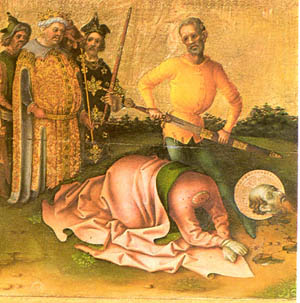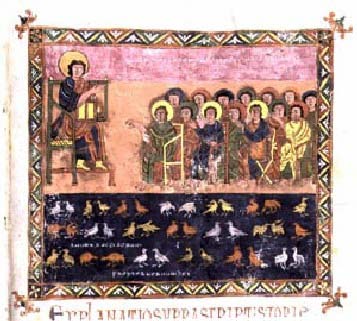 |
The Saint of the Day
St. Eulogius – March 11
Prof. Plinio Corrêa de Oliveira
Biographical selection:
St. Eulogius was a Spanish priest and martyr of the ninth century. Because of his fearless and intrepid confession of Christ, he was scourged and beaten with rods, and finally beheaded during a Saracen persecution in the city of Cordova.

Martyr beheaded, by Lochner
|
In the year 850 the Cordoban caliph initiated a violent persecution against the Catholics. Eulogius, a member of one of the most distinguished families of the area, stood out for his writings defending the various martyrs of that persecution.
He defended the voluntary martyrs who presented themselves to be killed, a position criticized by many as rash. The Muslims, surprised to see so many Catholics offering themselves as martyrs, became fearful of a Catholic uprising that could threaten their rule. Caliph Abd-er-Rahman II called together the Bishops to meet in Cordoba and put a halt to these voluntary martyrdoms. In fact, the council convened and forbade anyone henceforth to offer himself as a martyr. But the council did so in ambiguous and allegorical terms so that the Bishops might remain in the good graces of the caliph, while not directly condemning the martyrs, who were very popular.
St. Eulogius did not approve of this dissimulation and strongly resisted it. As a result, he was persecuted by both the Muslims and the Catholics who favored adaptation of the Faith to mollify the ruling Muslims. Firm in the defense of the voluntary martyrs, he was beheaded on March 11, 859.
Comments of Prof. Plinio:
At that time, there were two different problems: one moral and another political.
The moral problem is based on a psychological presupposition. For many persons, it is an unbearable torment to spend one’s life running away from danger. The ninth century persecution in Spain obliged Catholics to hide and run under cover of night from one place to another in order to avoid being caught and killed. For some of these Catholics, it was much easier to present themselves to the Arab authorities and say: “I am a Catholic. Kill me if you so desire.” It was a way to end the affliction of continuous flight.
This psychological position, which is understandable, is accompanied by a moral problem. Would this voluntary deliverance for martyrdom be a kind of suicide? It is a valid question. St. Eulogius defended these Spanish martyrs, as did St. Francis of Sales many centuries later. Both argued that this action did not constitute suicide, and that the ones who acted in this way were true Catholics and real saints.
At any rate, this was the reason why many Catholics delivered themselves to martyrdom in this way. The number of martyrs was growing so much that the caliph of Cordoba became concerned and decided to convene a council of Bishops so that they would put a stop to it.

The Millennial Judges and the
Souls of the Martyrs (depicted as doves)
Pierpont Morgan Library
|
It seems strange that a caliph could call together a council of Bishops, but one should remember that the Catholic Religion was only tolerated by the Muslims under the condition that Catholics would not cause any problems for the authorities. Therefore, the Bishops were under pressure and obeyed. It is similar to the policy that Communism adopts in the countries it dominates. It tolerates the Catholic religion only so long as it does not create any problems that could threaten its stability. It is a bad - but intelligent - policy, since it smashes the authentic Catholics and permits only the collaborators to survive. The good Catholics are destroyed or forced underground.
Since the number of voluntary martyrs in Cordova was increasing, the caliph feared that this phenomenon could generate a general radicalization that would endanger Muslim dominion over that part of Spain. So, he convened a council of Bishops to put a halt to the preaching of St. Eulogius against Islamism and his praise of the movement of voluntary martyrdom. As the caliph expected, the council condemned both the Saint and voluntary martyrdom.
That condemnation was both ambiguous and groundless. St. Eulogius resisted the order and continued to courageously support the martyrs. He was so bold in his defense that the only way they found to silence him was to kill him. He became a martyr.
What is the lesson we can take from this? In all epochs of the Church there are two currents within her bosom. One wants to be faithful to the Faith as it is. Another is composed of soft Catholics who want to accommodate, to lead good lives, to die tranquilly, and to that end, they compromise the Faith. One is a current of heroism, and the other of accommodation, compromise, and treason. Today, we have those true Catholics who want to keep the Church with the face she always had, and those compromised Catholics who want to adapt themselves as well as the Catholic Faith to the demands of the Revolution in our days.
St. Eulogius fought like a lion and passed through the difficult trial of being condemned by the Catholic Episcopate. It is easy to imagine how this made a man with the soul of a saint suffer. Notwithstanding, he resisted the bad Bishops and, doing so, he gave us an example of how an authentic love for the Church should be. That is, we should love the Church and her institutions in such a way that, even should the men who occupy places of authority condemn us, we would defend the Faith against them, since we should obey God first, and then men. We must be willing to suffer the condemnations and persecutions of those who want to accommodate the Faith to the world. In this sense, St. Eulogius is our patron saint, and we should ask him to give us the special kind of courage to face such situations, which in many cases is more meritorious than the courage of martyrdom.

  | | Prof. Plinio Corrêa de Oliveira | |
The Saint of the Day features highlights from the lives of saints based on comments made by the late Prof. Plinio Corrêa de Oliveira. Following the example of St. John Bosco who used to make similar talks for the boys of his College, each evening it was Prof. Plinio’s custom to make a short commentary on the lives of the next day’s saint in a meeting for youth in order to encourage them in the practice of virtue and love for the Catholic Church. TIA thought that its readers could profit from these valuable commentaries.
The texts of both the biographical data and the comments come from personal notes taken by Atila S. Guimarães from 1964 to 1995. Given the fact that the source is a personal notebook, it is possible that at times the biographic notes transcribed here will not rigorously follow the original text read by Prof. Plinio. The commentaries have also been adapted and translated for TIA’s site.

|
Saint of the Day | Home | Books | CDs | Search | Contact Us | Donate

© 2002- Tradition in Action, Inc. All Rights Reserved
|
 |

|